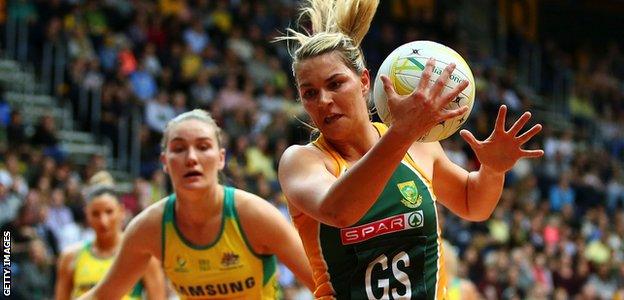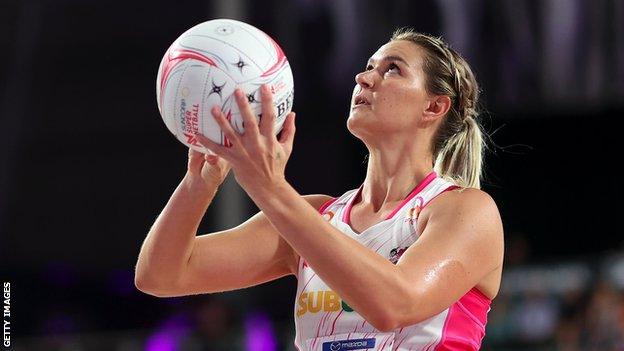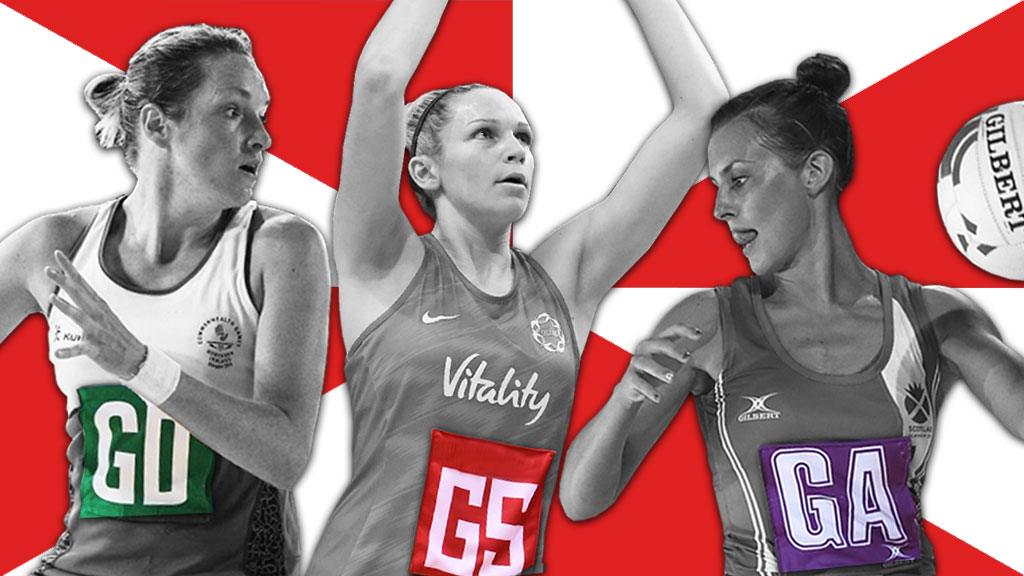Lenize Potgieter: South Africa netballer on mental health struggles
- Published
Watch BBC Sport Africa TV - South Africa international Lenize Potgieter speaks about her mental health
"I cried every day for two weeks and lost seven kilos in five days."
South Africa netball star Lenize Potgieter is back on the court after taking a six-month break from the sport following a nervous breakdown, and is keen to share her experience to help others.
"I want to start the conversation about mental health because ultimately that is more important than physical health," she told BBC Sport Africa.
The 27-year-old's struggle began in May last year when she was playing in Australia for Adelaide Thunderbirds.
"I thoroughly enjoyed my time when I played for the club and during the season, but I did get lonely," Potgieter said.
"I was living on my own and that always messes with people's minds. When you're on your own you start overthinking and start thinking of problems, and that is what happened to me. That affected me tremendously."
The goal shooter returned home to South Africa in August once the league ended, but problems in her personal life sent her on a downward spiral.
"When I got back home, I found out that my partner of one and a half years had been seeing someone else while I was overseas," she explained.
"I think there were so many things that were building up; with the netball and the stress and travelling, jetlag, Covid, quarantine this past couple of years, no stability at all, and then a betrayal when I got back.
"I think that sent me over the edge."
Following club duty, Potgieter was due to join the national team for a training camp in September, but her symptoms got so bad she had to seek medical help.
"I was not training, feeling sad, not excited to go and play the sport that I love so much and also crying," Potgieter narrates.
"Every morning I woke up and I cried. My mom slept next to me because if she didn't, I wouldn't go to sleep - but at least if she was there, I cried myself to sleep. In five days I lost seven kilos.
"I think the big sign for me was when I cried before getting on a plane to the training camp.
"That had never happened to me before ever. I think those were the moments that I realised 'You can't cry this much - something's not right'."

Lenize Potgieter made her international debut in 2014
Potgieter was diagnosed with major depression disorder, and she wasn't surprised.
"Once I heard that it was like a relief," she said.
"I never wanted to think of myself as being depressed. I just thought 'Yes, everyone gets blue days, I just get them a little bit more', but once she told me I'd been diagnosed with this, that made sense."
It was at this point Potgieter decided to take a break from her career and focus on her recovery. It was a big decision for someone who started playing netball aged eight and whose professional career has taken her to England, New Zealand and Australia.
"For the past seven years I have never missed a tournament for my national netball team, I have never missed a training camp for the team. Netball has always been a passion and I didn't feel that - as I had in previous years," Potgieter said.
"I thought I can't go and play netball at the stage. I'm not ready, something's happened to me that's never happened to me before, and that is missing a training camp and missing tournaments for the South African team, and it was really hard for me to do that because it is my country and I'm proud to represent them.
"There were too many external factors coming into my mind, heartache and a nervous breakdown, so I think that is the main reason I stayed away from netball - to find myself again, to find my happiness and to find Lenize who isn't the netball player."
Support from across the globe
Netball fans in South Africa noticed Potgieter's absence, and after fielding many questions about it she decided to share her diagnosis in a very personal social media post., external
Yet she had to cast off her own apprehensions before doing so,
"I thought it is personal, so I am not going to blurt it out to people I don't know," Potgieter explained.
"It (questions) got more and more and I thought maybe I can help someone out with this post. Immediately [after] it went on Instagram there were likes. There was nothing rude."
During her recovery, Potgieter acknowledges the role played by family, friends, her team-mates and even those who reached out to her from across the globe after going public.

Potgieter is back playing for Adelaide Thunderbirds after a spell away from netball
"The support I got was from everywhere in the world. The people I play against messaged me and they commented, and they are just like 'Thank you for opening up'," she says.
"I didn't expect the responses I got, but I'm very grateful I did go through with it because if I was able to help any one person that's already enough for me.
"It just gives me such a warm feeling inside to know that people care. They don't just read it and think 'You are just sad. Get up, get over it'."
Potgieter re-joined Adelaide Thunderbirds in February, saying she was "glad for a second chance" at doing what she loves most.
In opening up about her mental health struggles, Potgieter joined a group of elite athletes including Japanese tennis star Naomi Osaka and America's most successful gymnast Simone Biles who have also expressed the importance of speaking about mental health.
"I think it is important for us to open up, and show we are human beings. I want to break that stigma. If someone has depression it doesn't mean they have a contagious disease," Potgieter said.
Related topics
- Published10 July 2019
